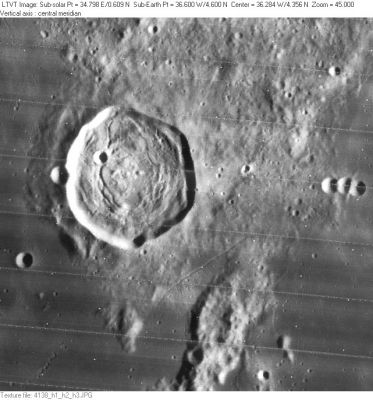Encke
Contents
Encke
|
Lat: 4.6°N, Long: 36.6°W, Diam: 28 km, Depth: 0.75 km, Rukl: 30 |
Table of Contents

LO-IV-138H1 Encke is the large polygonal floor-fractured crater with 4-km Encke N on its west rim.
In the mare to the southwest of that is the identically-sized Encke H; while on the right, the easternmost of the triplet of 3-km diameter craters is Encke M.
The rille to the southeast of Encke and the catena in the extreme lower left of the frame are officially unnamed.
Images
LPOD Photo Gallery Lunar Orbiter Images Apollo Images
A close-up of Encke C, a bowl-shaped crater south of Encke and Encke B, is seen on Frame 1154, made by Lunar Orbiter 1. Research: Danny Caes
Maps
(LAC zone 57C1) LAC map Geologic map AIC map
Powered Descent Initiation-PDI map of the region south of Encke (with Greek lettered hillocks) (source: ALSJ, Apollo 12).
Description
Description: Elger
(IAU Directions) ENCKE.--A regular ring-plain, 20 miles in diameter, with a comparatively low border, nowhere rising more than 1,800 feet above the interior, which is depressed some 1,000 feet below the surrounding Oceanus Procellarum. A lofty ridge traverses the floor from S. to N., bifurcating before it reaches the N. wall. There is a bright crater on the E. wall, and a depression on the opposite wall, neither of which, strange to say, is shown on the maps. Encke is encircled by ridges, which, when it is on the morning terminator, combine to make it resemble a large crater surrounded by a vast mountain ring.
Description: Wikipedia
Additional Information
- Depth data from Kurt Fisher database
- Arthur, 1974: 0.75 km
- Westfall, 2000: 0.75 km
- Viscardy, 1985: 0.75 km
- Cherrington, 1969: 0.7 km
The triplet at Encke M
- The triplet at Encke M (east of Encke) is difficult to locate on map 30 of Antonin Rukl's ATLAS OF THE MOON. The black "M" (of Encke M) was printed on the most westerly craterlet of the trio. Only two craterlets are visible. If the "M" was printed above or below the triplet, many observers of the moon should have aimed their telescope toward it. Alas, Encke M's printed "M" is "in the way". L.F.Ball, a contemporary English selenographer, seems to have discovered this triplet. Research: Danny Caes
- A nice twin of bowl-shaped craterlets is located a little to the west of Encke C. This twin was captured on Lunar Orbiter 1's Frame 1153. Research Danny Caes
- Encke X, south-southeast of the incomplete crater Maestlin R, has a rare dark ray northwest of it, see LO-3's Frame 161 (lower right part of the -Med- photograph), and Apollo 12's AS12-54-8108. Research: Danny Caes
- Strangely, Encke is a thermal anomaly crater, implying a youthful age Moore et al, 1980; yet it is a floor-fractured which implies an older age...
- TSI = 20, CPI = 5, FI = 25; MI =50 Smith and Sanchez, 1973
Nomenclature
Johann Franz Encke (23 September 1791 – 26 August 1865) was a German astronomer. Encke became famous as the discoverer of the short periodic comets. The first object of this family, the Encke comet, was named after him and so it is one of the few comets not named after the discoverer, but after the one who calculated the orbit. Later this comet was identified as the origin of the Taurids meteor showers.
LPOD Articles
Delta-Rim Craters
A dome or no dome?
Streamlined Islands (Mike Wirths's wonderful telescopic photograph of the Encke/Kepler region with the curious triplet east of Encke).
Bibliography
Drawing and text by Alika Herring. Sky &Telescope October 1966, p. 239.
This page has been edited 1 times. The last modification was made by - tychocrater tychocrater on Jun 13, 2009 3:24 pm - afx2u2